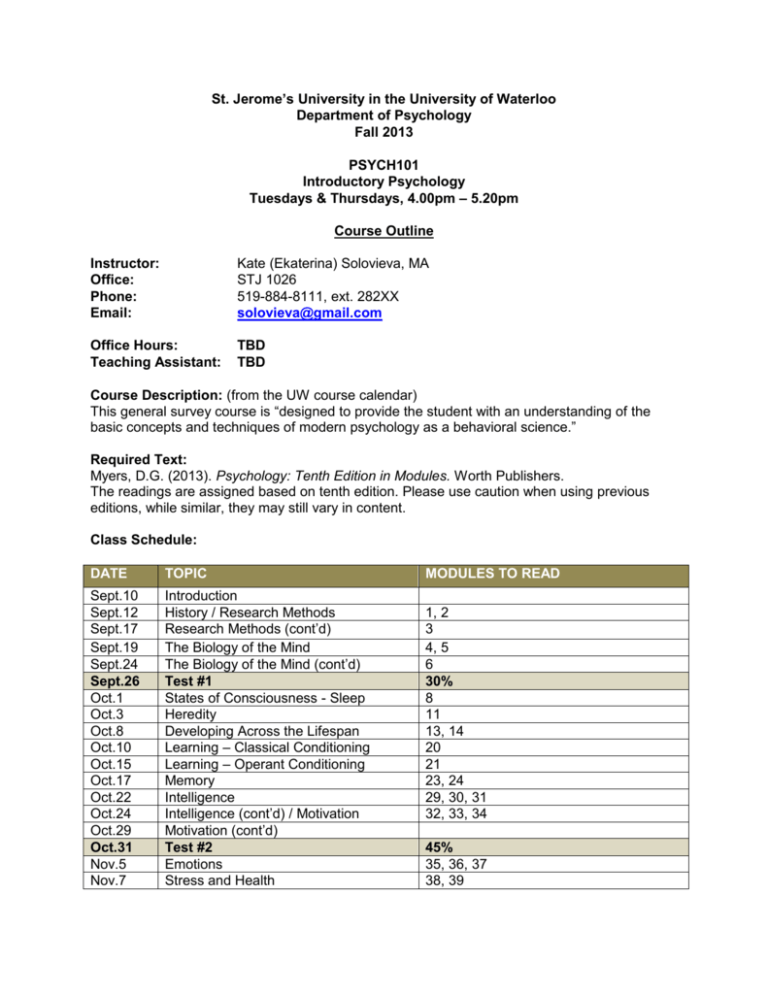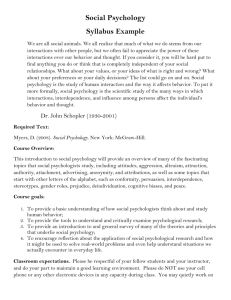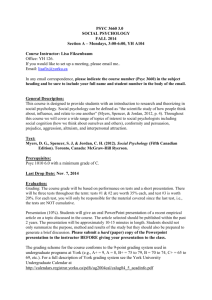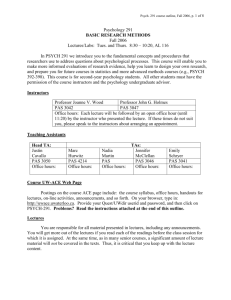Psych101 Course Outline Fall 2013_K
advertisement

St. Jerome’s University in the University of Waterloo Department of Psychology Fall 2013 PSYCH101 Introductory Psychology Tuesdays & Thursdays, 4.00pm – 5.20pm Course Outline Instructor: Office: Phone: Email: Kate (Ekaterina) Solovieva, MA STJ 1026 519-884-8111, ext. 282XX solovieva@gmail.com Office Hours: Teaching Assistant: TBD TBD Course Description: (from the UW course calendar) This general survey course is “designed to provide the student with an understanding of the basic concepts and techniques of modern psychology as a behavioral science.” Required Text: Myers, D.G. (2013). Psychology: Tenth Edition in Modules. Worth Publishers. The readings are assigned based on tenth edition. Please use caution when using previous editions, while similar, they may still vary in content. Class Schedule: DATE TOPIC Sept.10 Sept.12 Sept.17 Sept.19 Sept.24 Sept.26 Oct.1 Oct.3 Oct.8 Oct.10 Oct.15 Oct.17 Oct.22 Oct.24 Oct.29 Oct.31 Nov.5 Nov.7 Introduction History / Research Methods Research Methods (cont’d) The Biology of the Mind The Biology of the Mind (cont’d) Test #1 States of Consciousness - Sleep Heredity Developing Across the Lifespan Learning – Classical Conditioning Learning – Operant Conditioning Memory Intelligence Intelligence (cont’d) / Motivation Motivation (cont’d) Test #2 Emotions Stress and Health MODULES TO READ 1, 2 3 4, 5 6 30% 8 11 13, 14 20 21 23, 24 29, 30, 31 32, 33, 34 45% 35, 36, 37 38, 39 2 Nov.12 Nov.14 Nov.19 Nov.21 Nov.26 Nov.28 Personality Social Psychology Social Psychology (cont’d) Psychological Disorders Psychological Disorders (cont’d) Test #3 40, 41, 42 43, 44 45, 46 47 48, 49, 50, 51 25% Please note that you have an alternative to the above grading scheme. You can choose to write a paper for this course, in which case your grade will be calculated as follows: Test #1 – 25% Test #2 – 25% Test #3 – 25% Paper – 25% You have to let me know if you decide to write the paper by October 31, 2013 by email. By emailing me, you are committing yourself to the alternative grading scheme. HOUSEKEEPING Please review this section in detail before asking further questions about the course logistics. Chances are your question is already answered below. CONTACTING ME Students using email to contact me must include their first and last names, student number, and course in which they are enrolled in the email subject line. I also ask that you include a basic greeting – for my sanity’s sake. ATTENDANCE I like you, and I’d like to see you. Every week. Twice a week. While you will find an overlap between the material in class and the material in the textbook, I do not lecture directly from the textbook – not only I think that would excruciatingly boring, it would also be a waste of your time, and your money. There is a positive correlation (we will learn all about that in one of our lectures… if you decide to attend, that is) between regular class attendance and a grade in that course. Make your own conclusions. TEXTBOOK Yes, you will need the textbook. You can buy it, split it, borrow it, get it from a library, or obtain the information within using any other (legal) means necessary. I will be using tenth edition for this course, thus, please use any other edition or any other textbook (be it another introductory psychology text or a study guide for organic chemistry) at your own risk. 3 CLASS NOTES I will post Power Point slides for every lecture on the course website. Please note that the slides by themselves will NOT provide you with the necessary information. I use the slides as an organizing structure for my classes. You may find the slides helpful, as they provide you with the outline of the class and allow you to focus on all the additional material and examples. If you miss a class, it is your responsibility to get more detailed class notes from a classmate. TESTS The tests will be non-cumulative and multiple-choice. We will not have a lecture on the test days. There is no final exam in this course. ELECTRONIC DEVICES Unless you are a president of a country (in that case, please introduce yourself), you can probably manage to unplug for just over an hour twice a week. If you’ve ever had a conversation with a person, while they typing away on their phone, while nodding once in a while, and reassuring you that they are “listening”, you can understand why I ask that you do not email, text, Facebook, chat, or whatever else the cool kids are doing on their phones these days, while in class. CHEATING. In his novel “Kite Runner”, Khaled Hosseini claims that “there is only one sin, and that is theft. […] When you cheat, you steal the right to fairness.” Do not steal. DIFFICULTY WITH COURSE MATERIAL Please get in touch with myself or the teaching assistant earlier rather than later in the semester. There is no “extra credit assignment” you can complete at the end of the semester in order “to boost your mark”. Instead, let’s aim to address any issues early on. UW POLICY REGARDING ILLNESS AND MISSED TESTS The University of Waterloo Examination Regulations state that: A medical certificate presented in support of an official petition for relief from normal academic requirements must provide all of the information requested on the “University of Waterloo Verification of Illness” form or it will not be accepted. This form can be obtained from Health Services or on the link provided above. If a student has a test/examination deferred due to acceptable medical evidence, he/she normally will write the test/examination at a mutually convenient time, to be determined by the course instructor. The University acknowledges that, due to the pluralistic nature of the University community, some students may on religious grounds require alternative times to write tests and examinations. Elective arrangements (such as travel plans) are not considered acceptable grounds for granting an alternative examination time. Academic Integrity: In order to maintain a culture of academic integrity, members of the University of Waterloo and its Federated University and Affiliated Colleges are expected to promote honesty, trust, fairness, respect and responsibility. 4 Discipline: A student is expected to know what constitutes academic integrity, to avoid committing academic offences, and to take responsibility for his/her actions. A student who is unsure whether an action constitutes an offence, or who needs help in learning how to avoid offences (e.g., plagiarism, cheating) or about “rules” for group work/collaboration should seek guidance from the course professor, academic advisor, or the Associate Dean. When misconduct has been found to have occurred, disciplinary penalties will be imposed under St. Jerome’s University Academic Discipline Policy and UW Policy 71 – Student Discipline. For information on categories of offenses and types of penalties, students should refer to Policy 71 - Student Discipline. Grievance: A student who believes that a decision affecting some aspect of his/her university life has been unfair or unreasonable may have grounds for initiating a grievance. For students who decide to file a grievance, students should refer to Policy 70 – Student Petitions and Grievances. In such a case, contact Dr. Scott Kline (scott.kline@uwaterloo.ca), Associate Dean of St. Jerome’s University. Appeals: A student may appeal the finding and/or penalty in a decision made under Policy 71 – Student Discipline or Policy 70 – Student Petitions and Grievances if a ground for an appeal can be established. In such a case, contact Dr. John Rempel (jrempel@uwaterloo.ca), Appeals Officer of St. Jerome’s University. Academic Integrity website (Arts): http://arts.uwaterloo.ca/arts/ugrad/academic_responsibility.html Academic Integrity website (Math): https://math.uwaterloo.ca/math/currentundergraduates/regulations-and-procedures/cheating-and-student-academic-discipline Academic Integrity Office (UW): http://uwaterloo.ca/academic-integrity/ Note for students with disabilities: The AccessAbility Services (AS) Office, located in Needles Hall, Room 1132, collaborates with all academic departments to arrange appropriate accommodations for students with disabilities without compromising the academic integrity of the curriculum. If you require academic accommodations to lessen the impact of your disability, please register with the AS Office at the beginning of each academic term. Turnitin.com: Plagiarism detection software (Turnitin) may be used to screen assignments in this course. This is being done to verify that use of all material and sources in assignments is documented. In the first week of the term, details will be provided about the arrangements for the use of Turnitin in this course. 5 PSY101 Optional Paper Guidelines Psychological Disorders DUE: November 28, 2013 This assignment will be submitted in HARD COPY in class. All assignments received late will incur a penalty of 5% per calendar day. Select a fictional character that you could argue suffers from a psychological disorder. Include a description of the character—including the particular book, movie, comic, or source for the character (if it is a series, indicate the particular episode or issue you are dealing with, as even fictional characters tend to develop over time). In 5-7 double-spaced pages, convince the reader that the fictional character suffers from a psychological disorder and recommend an appropriate therapy for that disorder. The disorder must be classified as such in the DSM-IV. Please include a photocopy of the appropriate diagnostic criteria in the appendix. As you are discussing a fictional character, your logical reasoning, your skill in arguing the case convincingly, and your ability to apply the course material are being evaluated. For example, we are not concerned with whether or not Wolverine really does have a psychological disorder, but in how well you present your case and incorporate the course material. You will be well advised not to select a character who, by definition, suffers from a psychological disorder. For example, “Beautiful Mind” is a film about an asocial mathematician with schizophrenia. There isn’t much to diagnose there, as most work has already been done for you. Instead, select a character without an obvious/explicit diagnosis and argue your case. Your arguments must be understood and convincing to a reader who does not know anything about your character, aside from what you say in the paper. Use proper citations, referencing, and APA format. Suggestions: For this paper, in particular, I strongly encourage you to swap papers with your peers and edit each other’s work. In this way, you can assist each other in developing your writing (and editing) skills. In addition, I would choose students who do not know your fictional character (as things that are clear to you may not be clear to someone, who does not know the character). You may find that it is best to swap papers with someone who is not your friend, as they may be more honest and critical in their feedback (rather than simply telling you that it is “good”). I would also suggest that you swap papers well in advance of the due date as you will likely need to create multiple drafts. Academic writing is a process of drafts and edits over time. Each draft of a paper (if it is given the necessary time and attention) tends to improve.








